
MARCUS TULLIUS CICERO
On Living and Dying Well
Translated with an Introduction and Notes by
THOMAS HABINEK
PENGUIN BOOKS
PENGUIN CLASSICS
Published by the Penguin Group
Penguin Books Ltd, 80 Strand, London WC2R 0RL , England
Penguin Group (USA) Inc., 375 Hudson Street, New York, New York 10014, USA
Penguin Group (Canada), 90 Eglinton Avenue East, Suite 700, Toronto, Ontario, Canada M4P 2Y3 (a division of Pearson Penguin Canada Inc.)
Penguin Ireland, 25 St Stephens Green, Dublin 2, Ireland (a division of Penguin Books Ltd)
Penguin Group (Australia), 250 Camberwell Road, Camberwell, Victoria 3124, Australia (a division of Pearson Australia Group Pty Ltd)
Penguin Books India Pvt Ltd, 11 Community Centre, Panchsheel Park, New Delhi 110 017, India
Penguin Group (NZ), 67 Apollo Drive, Rosedale, Auckland 0632, New Zealand (a division of Pearson New Zealand Ltd)
Penguin Books (South Africa) (Pty) Ltd, Block D, Rosebank Office Park, 181 Jan Smuts Avenue, Parktown North, Gauteng 2193, South Africa
Penguin Books Ltd, Registered Offices: 80 Strand, London WC2R 0RL , England
www.penguin.com
First published in Penguin Classics 2012
Translation and editorial material Thomas Habinek, 2012
Chronology and Ciceros Life Siobhn McElduff, 2011
Cover: Asarotos oikos mosaic (unswept room), depicting a mouse feeding on food remains on the floor, Roman copy of Hellenistic original by Sosos of Pergamon, 2nd century ad, from Rome, Vigna Lupi. (Photograph akg/De Agostini Pict.Lib.)
All rights reserved
The moral right of the translator has been asserted
ISBN: 978-0-71-819401-7
PENGUIN  CLASSICS
CLASSICS
ON LIVING AND DYING WELL
MARCUS TULLIUS CICERO (10643 BCE ), Roman orator and statesman, was born at Arpinum of a wealthy local family. He was taken to Rome for his education with the idea of a public career and, by the year 70, he had established himself as the leading barrister in Rome. In the meantime, his political career was well under way and he was elected praetor for the year 66. His ambitious nature enabled him to obtain those honours which would normally only have been conferred upon members of the Roman aristocracy. One of the most permanent features of his political life was his attachment to Pompey. As a politician he compromised for the good of the Republic; as a statesman, his ideals were more honourable and unselfish than those of his contemporaries. Cicero was the greatest of the Roman orators, possessing a wide range of technique and an exceptional command of the Latin tongue. He followed the common practice of publishing his speeches, but he also produced a large number of works on the theory and practice of rhetoric, on religion, and on moral and political philosophy. He played a leading part in the development of the Latin hexameter. Perhaps the most interesting of all his works is the collection of 900 remarkably informative letters, published posthumously. These not only contain a first-hand account of social and political life in the upper classes at Rome, but also reflect the changing personal feelings of an emotional and sensitive man.
THOMAS HABINEK is Professor and Chair of Classics at the University of Southern California. He has published extensively on Roman literature and culture, including The Politics of Latin Literature (1998), The World of Roman Song: From Ritualized Speech to Social Order (2005) and Ancient Rhetoric and Oratory (2005).
SIOBHN MCELDUFF is assistant professor of Latin Language and Literature in the Department of Classical, Near Eastern and Religious Studies at the University of British Columbia. She is the translator of Cicero: In Defence of the Republic.
Chronology
BCE Cicero born (3 January).
9187 Social War.
Cicero serves in the army of Pompey the Greats father.
Start of First Mithridatic War. Sullas first march on Rome. Marius flees Rome.
Death of Marius.
Philosophical and Rhetorical Works: On Invention (date uncertain).
8381 Second Mithridatic War.
Sullas second march on Rome. Proscriptions of Marius supporters.
8179 Sullas dictatorship.
Ciceros first extant speech (In Defence of Quinctius).
Cicero delivers In Defence of Roscius of Ameria. Marries Terentia (c. 80).
c. Birth of Ciceros daughter, Tullia.
7977 Cicero travels to the east and studies rhetoric in Athens and Rhodes.
Death of Sulla.
c. Cicero delivers In Defence of Roscius the Actor.
Ciceros quaestorship in Sicily.
7463 Third Mithridatic War.
7371 Verres governor of Sicily.
Delivers Against Verres. First consulship of Pompey and Crassus. Tribunes power of veto restored. Senate loses exclusive control of juries.
Cicero plebeian aedile. Delivers In Defence of Marcus Fonteius.
Lex Gabinia gives Pompey the command in the war against the pirates.
Ciceros praetorship. Delivers For the Manilian Law. Pompey given command in the Third Mithridatic War.
Birth of Ciceros son Marcus.
Ciceros consulship. Catilinarian conspiracy. Cicero delivers On the Agrarian LawII (January). Catilinarians delivered and Catilinarian conspirators executed (December). Tullia marries for the first time (c. 63).
Pompey returns to Italy and disbands his army. Clodius desecrates the rites of Bona Dea (December). Cicero delivers In Defence of Archias.
Clodius acquitted in the Bona Dea affair.
First Triumvirate (Caesar, Crassus and Pompey) formed.
First consulship of Caesar. Julia, Caesars daughter, marries Pompey. Clodius adopted by Fonteius and becomes a plebeian (March). Cicero unsuccessfully defends Gaius Antonius (his co-consul in 63) on an unknown charge.
Clodius tribune of the plebs. Cicero leaves Rome to go into exile (20 March). Caesar takes up his five-year command of the province of Gaul.
Centuriate assembly passes bill for Ciceros recall (4 August). Cicero returns from exile (4 September). Delivers On his house (29 September).
Cicero delivers In Defence of Sestius. Triumvirs renew their pact. Cicero successfully defends Marcus Caelius on a charge of public violence brought by Clodius.
Second consulship of Crassus and Pompey.
Philosophical and rhetorical works: On the Orator.
Julia dies in childbirth.
Crassus killed by the Parthians at the battle of Carrhae. Cicero elected to the College of Augurs.
Milo kills Clodius (January). Pompey appointed sole consul. Cicero delivers In Defence of Milo (April).
5150 Cicero governor of Cilicia.
Philosophical and rhetorical works: On the Republic and On the Laws (date uncertain).
Caesar asks the Senate to be allowed to stand for the consulship in absentia but is refused. Cicero returns to Italy (November).
Cicero arrives in Rome (4 January). Caesar crosses the Rubicon; start of the civil war between Caesar and Pompey (10 January); Cicero joins Pompeys forces (June).
Pompey defeated at Pharsalus (August) and murdered in Egypt (September). Cicero returns to Italy and remains in Brundisium until September 47, when Caesar grants him an unconditional pardon.
Defeat of Republican forces in Africa. Cato the Younger commits suicide (February). Cicero divorces Terentia and marries his ward, Publilia.
Next page
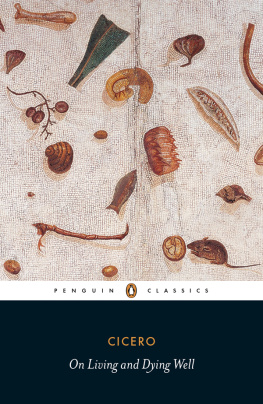
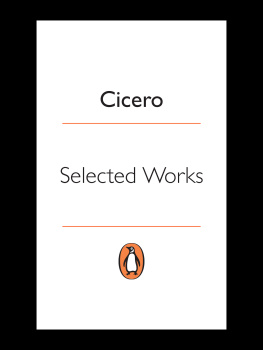



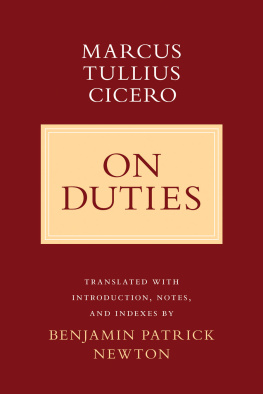

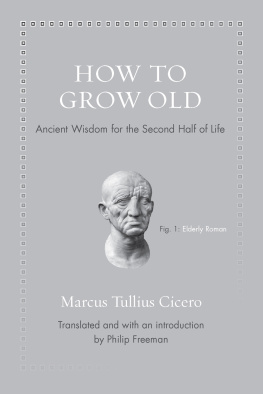
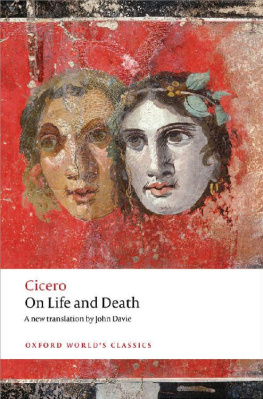
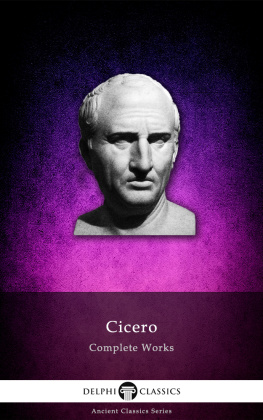

 CLASSICS
CLASSICS